https://www.theguardian.com/us-news/2018/apr/28/opioid-epidemic-selects-white-victim-black-addict
Brian Broome is an MFA fellow at the University of Pittsburgh
Amid the opioid epidemic, white means victim, black means addict
America’s social hierarchies rule everything – even the opioid epidemic. You don’t have to dig deep into the recovery process to find the hypocrisy to people of color
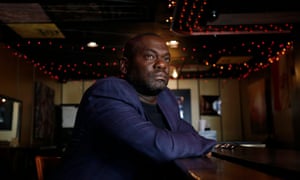
My cursor is hovering over the “unfriend” button, but I haven’t clicked it.
Today, my relationship-severing finger is poised to get rid of Matt. Matt is a friend with whom I spent a lot of time about six years ago. We were close in rehab, but I haven’t seen him since. I entered Greenbriar treatment center in Washington, Pennsylvania, just a few days after he’d arrived, and he showed me the ropes. For the next few weeks, we were virtually inseparable.
Rehab can be a frightening place when you first arrive. With any luck, you’ve already had some sort of “come to Jesus” moment with yourself and you’ve realized that you need to be there or else you’re going to die. I had had no such moment and was fully convinced that this was all a big mistake. Once I got through the door into the facility, I heard it lock electronically with a loud buzz and a finality that shook my bones. I immediately regretted it. There is no lonelier feeling on this Earth than sitting there, abandoned and broken. You’ve burned all your bridges on the outside and your life feels as though it’s half a world away. This is the moment when you really need a guy like Matt to walk up to you, thrust out his hand and say: “Hi! I’m Matt! What’s your name?”
Over the next few weeks, he and I attended group therapy sessions together and stayed up late talking about our problems, our addictions and our families. We ugly-cried in front of each other as we shared our darkest secrets, what we had done for drugs and how deeply unhappy we were. Matt is a man who, in many ways, helped me to take my recovery seriously in rehab and, in the first few weeks after my release, he helped me to remain sober on the outside.
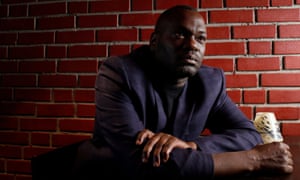
And, today, I sit in front of my monitor poised to cancel him forever because whiteness is apparently more addictive than any drug could ever be. We sobered up in the same facility, but he was a victim. I was an addict. Matt is a Christian. I am not. Matt is a Republican. I am not. And, most significantly, Matt is white. I am not. And these facts make all the difference in America.
These self-evident truths will wait patiently for you outside the walls of the rehab facility or any microcosm where black people might begin to feel the illusion of equality is real. Once you leave, these American realities attack you like a bully waiting in the bushes after school. They will, in one way or another, remind you that America’s social hierarchies will rule everything you touch. Even your recovery from drug and alcohol abuse. And you don’t have to dig very deep into the so-called “opioid epidemic” to find the hypocrisy and the insult to people of color. Matt is a victim. I am a drug addict.
The offices of Vision Towards Peace are behind a door so small in the borough of Wilkinsburg that, if you weren’t looking for them, you’d never know they were there. I have come here to talk with Erica Upshaw-Givner, its founder, about her perspectives regarding African American drug addiction and other problems facing our community. She is running a bit late, so I take a seat in the waiting room. To the left of my chair sits a large box full of children’s toys. I ask the receptionist if they’re doing a toy drive, and she says no. They get a lot of mothers who are seeking help, and it’s a good thing to have toys on hand. A woman waiting with me in the room is talkative. She reveals that she is a client and is struggling with addiction. Two members of her immediate family have been murdered, and living with the memory of their brutal deaths is making it difficult for her to maintain sobriety.
“It’s hard out there,” she says. “That’s why I like coming in here.”
After awhile, I figure out that she isn’t waiting for an appointment. She’s just hanging out, chatting with the receptionist. Wasting time because she doesn’t want to leave. She tells me that addiction runs in her family and assumes that I’m there to get help, too.
“Don’t be ashamed to get help. That’s what they do here.”
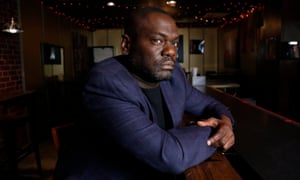
She tells me “God bless” when she finally decides to leave, and I am left to watch the waiting room TV. The reporter is telling me that the US Senate has just passed the Supporting Grandparents Raising Children Act for grandparents who are “increasingly coming to the rescue” of children whose parents have been victimized by drugs. I begin to count how many black people I’ve known throughout my life who have been raised by their grandparents for the same reason. I am still counting when Upshaw-Givner enters the room and tells me to come on back to her office to talk.
She is relaxed and comfortable in a way that makes me immediately want to tell her my darkest secrets. I ask her about the opioid epidemic.
“Before this opioid epidemic, or those words were used, I was already working with this population. But, it wasn’t an ‘opioid epidemic’ then. It was just called a ‘heroin addict’.”
Upshaw-Givner is an African American woman and has been a licensed clinical social worker and working in addiction counseling for about 16 years. After her organization outgrew its space in the Hill District, another predominantly African American neighborhood in Pittsburgh, it moved to Wilkinsburg.
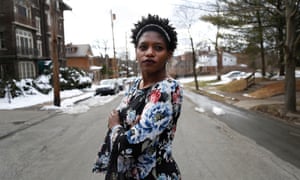
Upshaw-Givner said everyone was welcome at Vision Towards Peace. Having dealt with addiction in her own family, Upshaw-Givner is enthusiastic about providing services to all who have been adversely affected by addiction. Though all are welcome, the clientele at Vision Towards Peace is roughly 83% African American, 5% biracial and the rest are white – people whom Upshaw-Givner diplomatically refers to as “our counterparts”.
“The ‘opioid epidemic’, the crisis response, that is for ‘our counterparts’,” Upshaw-Givner says.
Back when Upshaw-Givner was working with African American veterans, pregnant women and youth on methadone, it was different than it is now. “A lot of times, when you look at our counterparts, they want to justify this addiction as: ‘Well, it was just pills. I was in a car accident and one thing led to another.’ But, when our people had those issues, they were still a dopehead or a dope addict and that was the label they had.”
I remember the images that flashed across the TV earlier while listening to the newsman tell me about the Supporting Grandparents Raising Children Act. Compassionate emergency medical personnel were gingerly removing skinny, ghostly white bodies from messy homes. Had I not known what the story was about, I would have thought they were the victims of an earthquake or other natural disaster. Victims.
I remember my own psychological self-abuse when I was using drugs. I was just an addict. It was my fault, and there was no way out. I remember knowing for certain that I was no victim of an epidemic. I was just garbage and knowing that made me want to use more. I wondered, if I had known that I was just the victim of an epidemic, whether I would have thought differently.
“Once our counterparts started dying, it became a public health crisis. But it wasn’t a public health crisis 15 years ago when I was in the field and going to black people’s homes, providing care for them.”
Vision Towards Peace is not a rehab facility. It’s a smaller organization with four African American clinicians. The organization’s focus is on mental health and, oftentimes, mental health issues come with an attendant diagnosis of substance abuse.
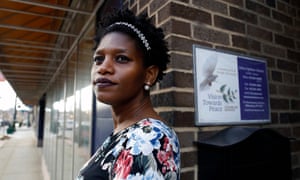
Mental health issues such as depression and anxiety have always been a staple of African American life. These ills just come with the territory of being black in America. In short, being subject to unchecked bigotry will make you depressed and anxious. Negative stereotypes, income inequality and daily casual and overt racism play a part in our everyday existences and, because we have learned to accept these conditions as an unpleasant fact of life, we often go undiagnosed or turn to drugs and alcohol to cope. Often we do not trust doctors due to historical prejudices and bias embedded in the American medical industry. Our addictions are believed to be because we are feckless, lazy and unwilling to pull ourselves up by our bootstraps in what most white Americans consider to be a meritocracy. And what they refuse to understand has been killing us both directly and indirectly for centuries.
I have had two white friends die of heroin overdoses in the past year. They were good people from middle class homes. I know that their families voted for Trump. I know that their families are also racists. It’s been said that increasing economic hardship is what is driving so many white Americans to turn to the needle – hardships that black Americans have lived under since time immemorial. Yet white people keep voting in the same individuals responsible for that economic hardship because the explanation that someone brown is to blame for their troubles works every time. I ask Upshaw-Givner what she thinks of this.
“I think of hierarchies and how we are important in society. When our counterparts go outside, they know that a white man is important and then a white woman is important. Then a black woman is important and then a black man is beneath that. So, when they seek help at Vision Towards Peace, I don’t look like them and they don’t look like me and they can still maintain their hierarchical position of ‘better than’ even in this office. It makes me think sometimes about how they find me and why they stay.
“These offices are an intimate place where you divulge the most intimate details. So, why would they come here to a black woman? Even if they don’t feel above me as their therapist, they don’t feel beneath the therapist who looks like them. You see what I’m saying? Even here, where they’re seeking help, the hierarchies play out.
“I don’t judge anyone, but, even if I did, our counterparts don’t care if I judge them because in society they are still more important than me. It doesn’t matter how much education I have or what I’ve done. They want to still maintain their level of importance.”
I leave the Vision Towards Peace offices with a lot to think about. I remember that I was in rehab over Christmas time and how lonely and isolated I felt away from my family. I was at my lowest. I sat in the common room and cried. Matt came in and asked me to join a group of people he’d assembled for a small Christmas celebration. I told him I just wanted to be alone. He sat down anyway. He told me that God had given me many blessings and I should be grateful. He told me I was “smart” and “articulate” and that giving praise to God is nothing to be ashamed of. I was so low in myself that I took this as a compliment at the time. It made me feel better. I reluctantly followed him.
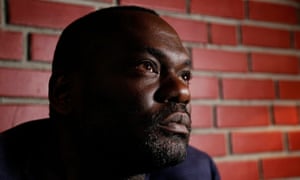
I am remembering this moment now and the full weight of the racist condescension behind his comments hits me as I’m on the bus leaving Vision Towards Peace. I take out my phone and find his Facebook profile, his smiling face looking up at me. I go through his friends list and see that I am the only one without Trump support filling their walls. I am the only black one. I hover my thumb over the unfriend button. Then I think maybe I can talk to him. Maybe if I explain it better, he might really listen. I spare him for now and shove my phone back into my pocket.
When I left rehab five years ago, they gave me instructions on my last day to attend 90 meetings in 90 days. By this time, I had seen the light and was more than willing to comply. I didn’t want to go back to my old life. It was a shambles. Many people who don’t struggle with drug addiction tend to conflate drug and alcohol use with a “good time”. The reality is quite different. Drug abuse is about pain and loneliness. But I’ve stopped going to meetings so much because I know who I’m sitting with when I go.
It happens outside during cigarette breaks when “our counterparts” reveal themselves. They blame drug trafficking for the fact that they’ve been ensnared into this life of ugliness. It’s the Mexicans who bring it across our borders who are to blame. Dealing with the Mexicans is the only way to stop the problem. I find this kind of talk incomprehensible. The parents of white drug addicts are the most delusional. They are incredulous that their little angel may have, in fact, picked up the needle under her own power and sunk it into her own skin. So now we all have to build a giant wall to protect her. Because white America cannot believe that brown people aren’t the basis of all their problems.
I meet Nique Craft for the first time at the library. We were introduced via social media. Over the phone I’d joked about being hungry for fried chicken, and she brings me some that she’s made. Craft is an unemployed chef and is very open about her past and current struggles with drug abuse. “I feel like, with potential employers, if I don’t talk about it and it comes up or they find out, they think I’m trying to hide it.”
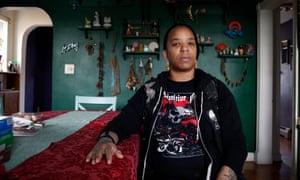
She has done a lot of other kinds of drugs, but her drug of choice is heroin.
“Heroin was always on my list of ‘don’t do’. I won Dare awards in the fifth grade. I won four years in a row. I always won. I was always really afraid of needles as a kid, too.”
I ask her how she wound up doing the drug she most feared. She most feared the needle, but the needle eventually became her favorite way to administer drugs.
“It was through my proximity to white people that I was put in the path of drugs. I think I was more of a needle druggie at the very end than anything else.”
She says there are two types of white drug addicts. “There’s just the straight-up uneducated kids and then there’s the rich kids who want to create problems who don’t really have them – those are the kinds of kids I usually wound up hanging out with.”
It was through a chain of coincidences and bad choices that heroin wound up in her field of vision. But always with white people. She says she takes full responsibility and is on track to getting her life back together. She has been clean for four years and is currently “white-knuckling it”.
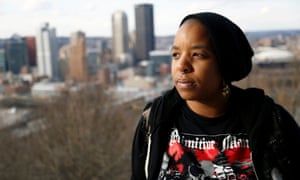
The world of drug addiction for Craft has come with all its worst terrors: jail time, sex work, selling drugs herself and homelessness. But the experience of being a black woman and a heroin addict is not one you’ll see on the news. Recently, the American airwaves regarding opioid abuse are too full of stories of white people who have fallen on hard times and turned to opioids. And I want to know what she thinks of all this.
“All of the people I did drugs with were white. All of our dealers were black. The dealers specifically wouldn’t deal with the white kids because they were white. They would only deal with me. So I became this middleman. I don’t think it was a conscious decision that any of us made. Those chips just fell.”
I ask her if she feels she became the “black girl” in the group, and she answers in the affirmative. There were always random jokes about it. “That came up all the time. I buried my self-hate within the drugs.”
I come from a similar background and I tell her this. Being the only black child plunked in the middle of whiteness has its effects. I’ve grown up with the idea that I was to be accommodating them if only to keep them off my back. I suffered the jokes and the humiliations, knowing that it was better to not cause trouble. Craft’s experience goes even deeper.
She was adopted and raised in the suburbs of Newburgh, New York, by a German white mother who occasionally extolled the virtues of Hitler. She said her upbringing was emotionally fraught, and they are no longer in contact. This is the kind of pain that gets ignored in our national narrative about drug addiction. The pain of racism and the mental health issues it leaves in its wake are never addressed.
“So, I haven’t been diagnosed with bipolar, but I have the tendencies. I have been diagnosed manic depressive. I’ve been told that it’s harder to diagnose black women with bipolar.”
Why?
“This idea of the crazy black woman, the angry black woman, the take-no-nonsense black woman can oftentimes play into your mental illness. But people don’t see the mental illness part and just assume that you are being this angry black woman. Or [there’s] this myth of black woman strength. They don’t think we feel pain as much. You’re a black woman, you’re strong. You can get through anything. Well, there are times when we are not strong and they don’t believe us.”
I have been guilty of believing this myself.
When she shares that she’s overdosed on several occasions, I let her know I haven’t and she tells me what it’s like. She says overdoses usually happen when you’re alone; when you wake up and realize that there is no one there to help you, it’s terrifying.
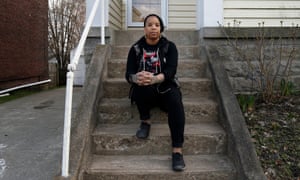
Craft hasn’t gotten much support from her white friends. She attributes their attitudes to the fact that they seem to always have support and, now that they’re dying in record numbers, support is coming from the US government itself.
Craft cleaned up cold turkey without ever having gone to a rehab facility. She has never been prescribed Suboxone, a drug that is more and more replacing methadone for heroin addicts. When she tells me this, I think about what Upshaw-Givner told me about the drug.
“Suboxone doesn’t test positive on a drug screen so you can go and get a job. Dissolve it under your tongue and get a job. Methadone shows up on drug screens. So you had all these black people losing their jobs for testing positive. But they didn’t think about that when it was just us. Now, it’s pretty and cleaned up so that certain people can maintain their status.”
Craft is doing well now.
Since we first talked, she has found a job as a chef.
She is funny, honest and outgoing and getting clean all on her own is quite a feat if you know anything about heroin addiction. I ask her the tritest question of them all next – what advice would you give to others who are struggling?
“It’s really hard when I try to talk to people about getting off drugs.” I ask her why and the tears begin to flow. “Because every time I thought about it, my plans were to kill myself. Not to get off drugs, but just to get away so I could do my final amount.”Now I’m crying, too. Because it would be a shame for the world to lose such a bright person. I ask her who her support system is made up of now. “Now all my friends are women of color, mostly black, and a few white allies.”
I pull out my phone to look at Matt’s profile and wonder if I should delete him right then and there. I ask Craft what she thinks about white people.
“I sat at the table. As an adoptee, I sat at their tables and I know how they think. I know how they think when they don’t like us at all. I know how they think when they think that they love us but they have no idea about us. There’s so many levels to how they feel about us. I’m almost at a point of pity because all of it comes from them not knowing anything. They have to make themselves feel superior because they know they really aren’t. They find little tidbits of the truth about how they’ve been lied to their whole lives. They know that there’s a crack in their armor, and it’s very hard for them to accept it.”
I say goodbye to her and leave the library.
Back at Greenbriar, Matt once told me that he was really sorry that I’d fallen into alcohol and drug abuse. He told me that he thought I could really do something with my life and now I’m not so sure what he meant. That was a long time ago and he has since gone back home, surrounded by rural white people, many of whom I assume to believe every racist thing they were ever taught, who believe me and Craft, and even Upshaw-Givner with all her work to make the world a better place, to be somehow inferior. I pull out my phone and scroll through Matt’s timeline, where I see conservative, borderline racist viewpoint after conservative, borderline racist viewpoint. I read quotes he posted from conservative political commentator Tucker Carlson, and I know that he never really considered me a friend. I was only there to assure him that he was not racist, which is what many white people do with their black friends. He was a victim. I was an addict.
The opioid epidemic is yet another slap in the face to black Americans that we can see clearly, but white Americans cannot. I find myself wishing that there was a rehab for them to go to. A place where they can unlearn all of the falsehoods about race that they’ve been taught. I wish there was a place that could prove to them once and for all that they are not favored by God and superior because of the color or lack thereof in their skin. I wish there was a place that could prove to them that this thinking is nothing short of a pathology. But no such place exists and, in the end, it’s hard to disabuse anyone of a lie that comforts them. So, I decide finally to delete Matt from my contacts. I use my index finger and push the “unfriend” button succinctly and with purpose. The Trump administration has announced plans for a temporary memorial outside of the White House in honor of opioid abuse victims. Victims of this epidemic. I think about this for a moment and then I block Matt for good measure.
Comment;
This is an equal opportunity killer, black, brown, white, yellow, and especially red, it kills all of us without regard for who we are or what color we are.
- COVID UPDATE: What is the truth? - 2022-11-08
- Pathologist Speaks Out About COVID Jab Effects - 2022-07-04
- A Massive Spike in Disability is Most Likely Due to a Wave of Vaccine Injuries - 2022-06-30

